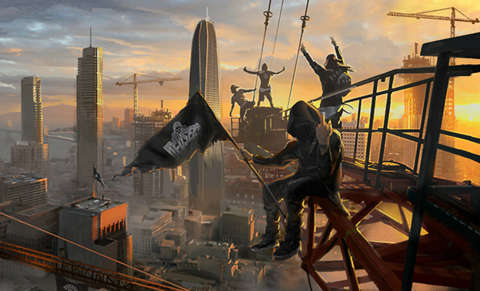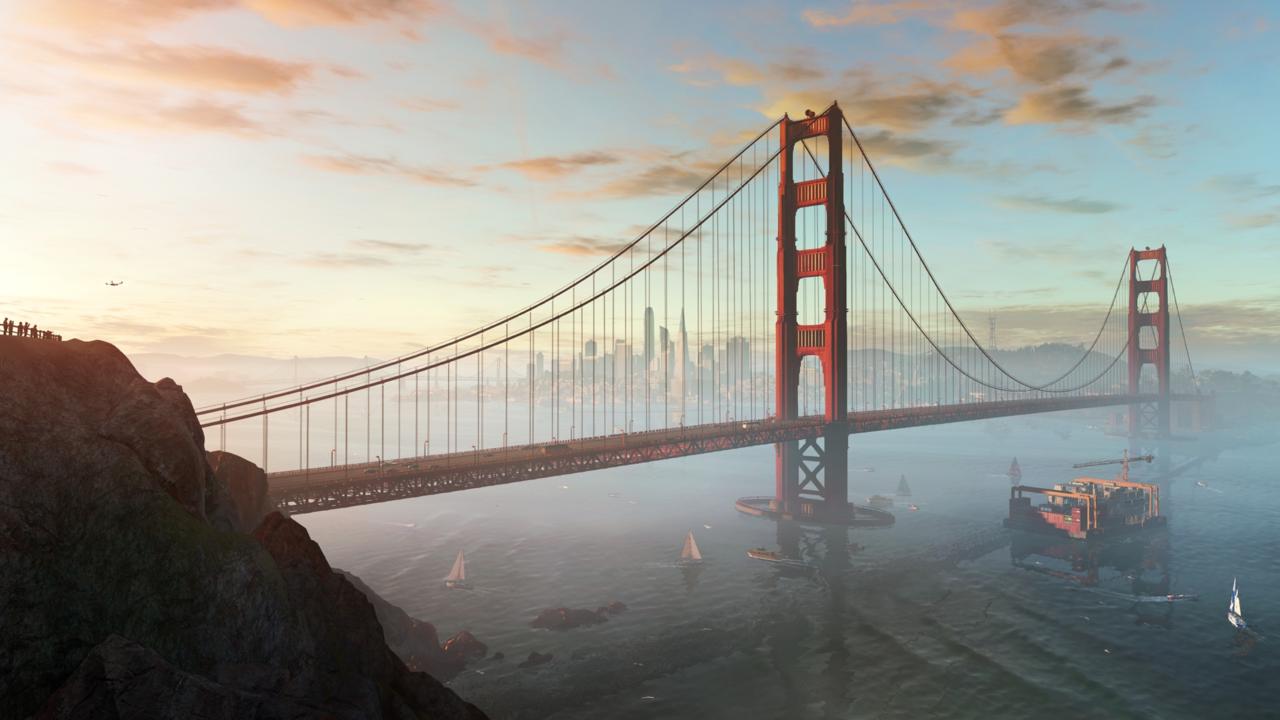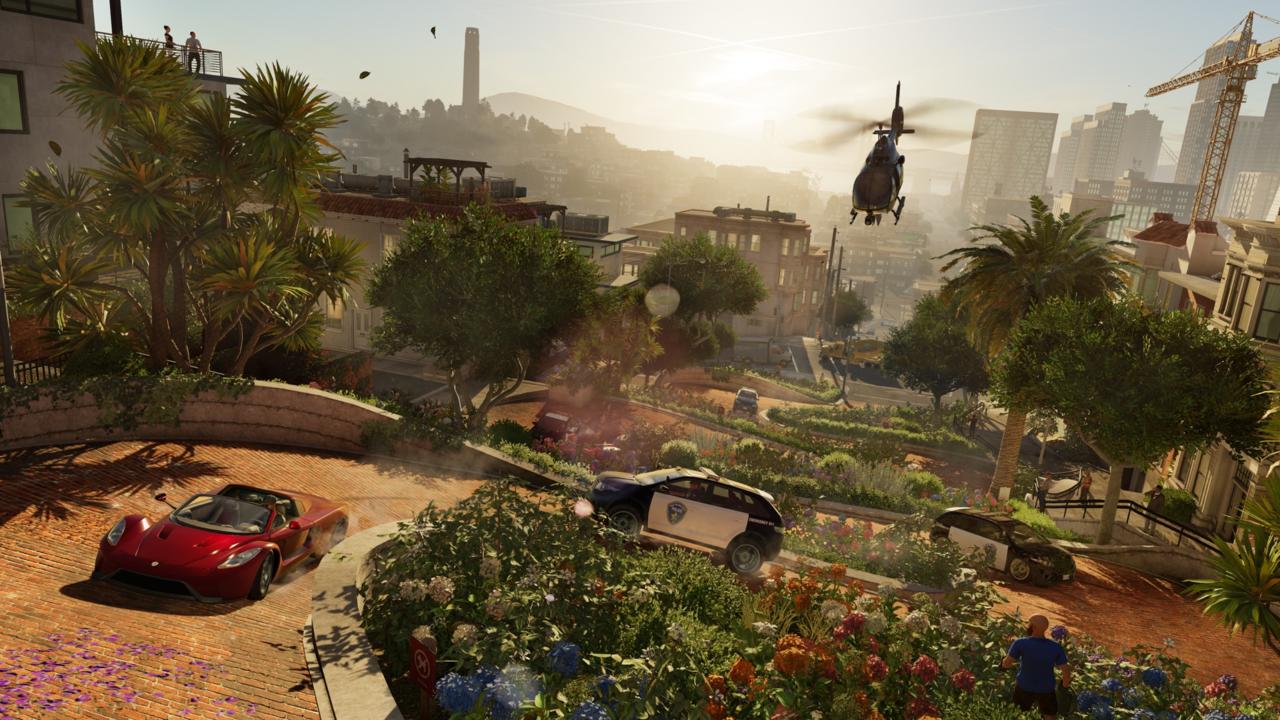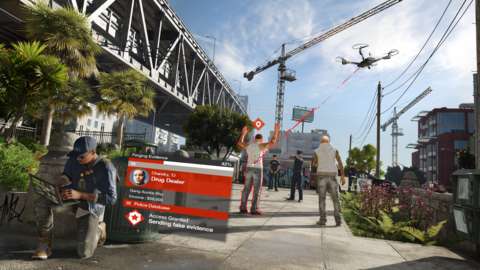On an aesthetic level, Watch Dogs 2 couldn't look more different than its predecessor. The first Watch Dogs took us through the darkened, rainy streets of Chicago. The sequel is bringing us to the fog and sun of California's Bay Area. The first game featured a lone wolf protagonist. The new character is a member of a thriving underground community.
But there's more to the new setting and new characters than that. To shed more light on the story and narrative of Watch Dogs 2, we sat down with lead writer Lucien Soulban, who's written the scripts for titles such as Far Cry 3, Far Cry 4, Far Cry 3: Blood Dragon, and Tom Clancy's Rainbow Six: Vegas.
With Watch Dogs 2, Soulban wants to make use of the Bay Area's diverse culture, and the people that grew up here, to illuminate class struggles, economic problems, and the dark side of technology. If successful, Lucien says, Watch Dogs 2 will address all three.
GameSpot: What kind of story is Watch Dogs 2 trying to tell that Watch Dogs couldn't?
Lucien Soulban: Watch Dogs 1 was dealing much more with mass surveillance. We've evolved that process to where the story we're trying to tell is about how all that information is being used. It's not enough to just collect that data. It's about how it's being applied, and how it's being applied against people. Whether we're talking about prediction of who you are, what your medical history is, what kind of education you have versus what kind of money you're going to make in the future, whether you're going to be a troublemaker or not.

We have that predictive element, but we also wanted to talk about how everything is sort of becoming interconnected now, and how technology's stripping our ability to understand it as much. That's one of the reasons we ended up focusing on a group of hackers. They're capable of parsing the information and understanding it and working toward understanding exactly what it means on a social level.
It reminds me of Facebook, the algorithm they use to know what to advertise for certain users.
Right.
Even who you might vote for...
Exactly. It's even more than that. I remember a frightening story that I once heard. There had been a medical study done on this island where, the people living there had been intermarrying for generations. They ended up sharing a lot of commonalities between each other in terms of medical history. Researchers gathered information on these people, and then they turned around and sold this information to insurance companies. Can you imagine, though, that the insurance companies would have the ability to tell these people whether or not they could be covered for certain things because people of this community were more prone or at risk for this sort of thing.
That's one of the huge inspirations for us, the idea that you could be prejudged. You could be pre-vetted for certain things before you even had a shot of making your case or putting a face to whatever you wanted to do.
Is that why you chose to have an African American character, a person of color, as the protagonist?
It's something that actually I'm really looking forward to seeing. San Francisco is a vibrant city. It's a diverse city. But it has its issues. It's undergoing a lot of social upheaval in terms of gentrification and everything. We wanted somebody that represented and was able to walk between those two things so that when he spoke, he spoke with a certain level of authority. You could believe that he had undergone or had seen certain things growing up where he grew up. When he said that there was a need for change, you understood why there was a need for change as well.
Marcus wasn't a checklist of things that came up. We wanted somebody that spoke with a certain level of authority on things.
Lead writer Lucien Soulban
Part of Marcus's design, it wasn't a checklist of things that came up. It was only, "Who do we have? What are we saying about the city of San Francisco and the Bay Area, and where do we go from there?"
So he was the organic solution to all the things you wanted to tell in this story?
Definitely. Those are the best stories that work, because they require the least amount of exposition and justification. With Marcus, and with any of the characters that we designed, we wanted to make them seamless with the hacking culture and community, and seamless with the experience of San Francisco itself.
So you have the Bay Area and you have the trailer saying it's like the Wild West of technology, but it's also a hub for the information era. How much commentary is there? How many real world parallels are there between the companies you're going to see in Silicon Valley and the companies you might see in Watch Dogs 2, and how they go about communicating to the world?
The interesting thing with that is that we try to avoid the, "Oh this company is exactly like this company. Therefore, all we're going to do is just file off the serial number." It's more taking a look at what these technological companies are doing and how they've cornered the market on certain things, and that acted a little bit as our guidepost. We would say, "We want to represent this aspect. We want to talk about what's happening with this. Who's the company in our world that would be emblematic of that? Who's our social media giant in our world? How do people talk to each other and socialize with each other?"
I'm not going to get into specifics, but let's say we wanted to get into this one mission that pushed telecommunication technology. We'd say, "Who is at the forefront of this technology?" You're going to see a lot of parallels, but I think the parallels exist because it's where technology itself is taking us, and where technology itself has grown.

It also strikes me that Marcus is much more of a group person. Aiden Pierce was this rogue, this lone wolf, and now a big part of the design of this game, it seems, narratively and gameplay wise, is building as a group, and encountering other players in the world. Is there much more of an effort to make Marcus this team player?
The minute we said we wanted to deal with the hacking community, it could no longer be the idea or the notion of a lone wolf. Who Aiden was, it made sense for him to go it alone. For who Marcus is, it makes sense for who he is, because he's looking for like-minded individuals.
I'll keep on using this term: meritocracy. You surround yourself and you come to appreciate the people who are intelligent, who are as equally capable as yourself. You can't really do that as a lone figure. You have to become part of something. It also allowed us to play off the different ideas of who Marcus is by who surrounds himself with in DedSec. You see him acting not so much as a leader, but as this guiding force behind the organization. You see how people rally behind him. We wanted to make somebody that was not only capable of fitting within a group, but also somebody where people would say, "I'm following him to the ends of the earth."
He seems very self-made, right? He's fashioning a weapon out of a billiard ball and a rope. He's 3D printing guns. That's not only self-made, that's also a very 21st century thing to do. Is this need to invent himself factoring into his overall personality?
I think it's a combination of two things. One, we wanted to focus more on the "maker culture" this time around, how people are just able to manufacture these really interesting things and how technology is allowing for that. I think Marcus is very much a self-made individual because he was raised in Oakland, but his parents come from an activist background. He's always seen the world around him. He's always seen what ends up happening.
Marcus has seen gentrification firsthand. He recognizes it, and wants to act on addressing it.
Lucien Soulban
When you have the gentrification push people out of San Francisco and into Oakland, and now the same thing is happening in Oakland, and gentrification is pushing people farther out on the fringes.
Marcus is one of those individuals who has seen that firsthand. He recognizes it, and he wants to act on addressing that. In some ways, he is very self-made. When it comes to hacking and programming, he's learned a little bit of it in school. But he's very much learned it at the pulpit of the internet. He's taught himself all these things. We wanted somebody that was very self-driven in that regard.
A lot of people see tech as a means for minorities to level the playing field. Is that reflected in Watch Dogs 2's story at all? How tech can be a means to fight back against problems like gentrification in a largely white society?
They do pop up in the story. They even pop up in some of the missions. You can't talk about San Francisco without dealing with that stuff. It is a must. It is part of the fingerprint of the city. We do end up talking about the hiring practices in Silicon Valley and how it's happening there. Marcus reacts in certain ways to other characters who may also be members of the visible minority. He changes how he speaks to certain people as a result of that.
That was definitely something we played around with, or rather we addressed and we looked into. We made sure that we gave it the proper respect, I guess you could say.

Leaving aside the actual directed narrative, how much role have you had in the writing of the world, that makes the world come alive, as opposed to "This is the plot of this mission. This is the plot of the story." How much have you been involved with just letting the Bay Area be a character in itself, so to speak?
We had different people addressing different aspects of it. For example, I would work with level design, and level design would say, "Could you provide us with what the spirit of this one community is?" I'd end up researching that neighborhood, that history, and say this is what you would see in those environments.
Later on, I ended up focusing on the factions and I ended up saying, "These are the factions. This is how crime works in San Francisco. These are the areas that are under control by different crime families, by different street gangs. This is the history of the street gangs." We really went into depth making sure that it was reflective and indicative of the history of San Francisco. We didn't go for the standard, "Los Angeles has Bloods and Crips, so obviously we're going to have Bloods and Crips." They never established a foothold really in the Bay Area. That's just one example.
We're making sure that this city has a verbal cue and a verbal life to it...whatever is necessary to give the world a voice.
Lucien Soulban
We're making sure that this city has a verbal cue and a verbal life to it. We work with level design to make sure that the proper areas were represented in different ways. We're very involved with world creation and it's the reason why our open world really comes alive--the writing teams are always there from the inception, from the get go, working to provide solutions, research, whatever is necessary to give the world a voice.
When you were saying you researched these different communities and how their culture works, how they sound--were you able to talk to people from these communities? Do you have diversity on the writing team? People from different backgrounds and cultures?
We have one writer who was raised in Oakland. We have another writer who has been living in San Francisco for a few years. We even spoke to the actors. Whenever we went into the recording studios and worked with the actors, we basically asked the actors, especially men and women of visible minorities, is this authentic to your experience here? Do you see anything in here that you don't think rings true or doesn't sound respectful to the Bay Area or these cultures?
We had an open dialogue with our actors. We had open dialogue with the people that we spoke to. We paid a lot of attention to what people were saying, and we incorporated that as much as possible in the writing that we did.

Our story, what we're trying to do, is very much of a reflection of San Francisco, both the high points and the low points. I think the thing that we do is we represent. We show this to the players and then we allow the players to go through that world and play through those issues according to how they see fit. I really hope that when the players play, they really feel that they're immersed in that location, that we have done our due diligence to the Bay Area and the cities of San Francisco and Oakland.
I've only lived in San Francisco about a year now, but it's definitely interesting to me as a setting. It's gorgeous and diverse, but it's rife with conflict. There's this stark disparity between beauty and otherwise.
Exactly. I've only had the opportunity to visit San Francisco around four or five times, and from what I've seen, I really like the city. There's a, if you'll pardon a French term, je ne sai quois there. It's also interesting looking at it and seeing the old parts of what San Francisco used to be against what it's becoming now, and seeing how those two are intermixed, or even how there's that sharp schism, that you can cross a street and you're suddenly almost in a new city.
Right. The Sunset neighborhood is extremely different than North Beach or Chinatown. There are completely different worlds only blocks apart.
That was one of the reasons why we found the city so interesting. You're talking about a location that has always had, at some point or another, some kind of gold rush, whether it's a gold rush, a silver rush, or now, a tech rush. It always feels like it's on the cusp of something, even if there are tough problems to face. We can't avoid them. We wanted to embrace that.
